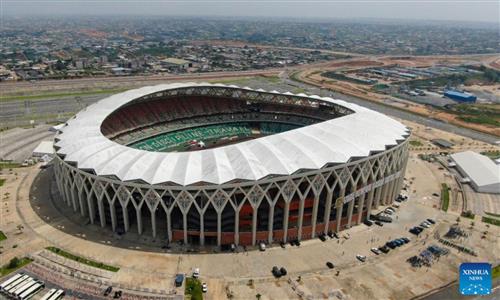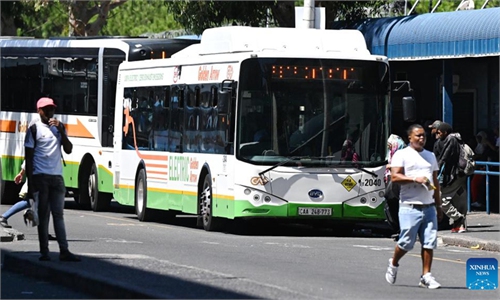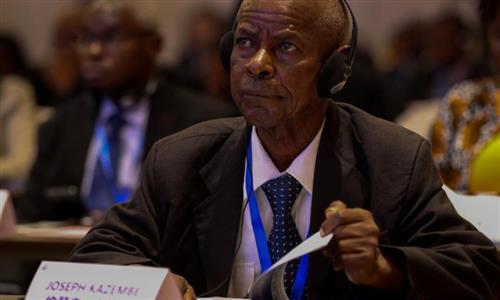
Illustration: Xia Qing/GT
Accra, the capital city of Ghana, is hosting the 13th African Games from March 8 to 24. Over 4,000 athletes are expected to participate in various track-and-field games, aiming to promote high-performance African sports and enhance cultural exchanges between African Union member states. These African games come nearly a month after the recently concluded Africa Cup of Nations (AFCON), which was successfully held in Cote d'Ivoire from January 13 to February 11, 2024. The true spirit of Pan-Africanism serves as the key pillar of the African Games.
Nevertheless, being able to successfully host these sporting events in Africa has not been inherently guaranteed due to the poor state of the local infrastructure. Knowing of Africa's enduring challenges of under-development, China has played a pivotal role over the past five decades by providing financial support and actively participating in the construction of numerous sports facilities and stadiums across the continent.
For instance, in Tanzania, China aided in the construction work to enlarge the Amaan Stadium in 1970, thereafter refurbishing it to international standards, and the construction of the Tanzania National Main Stadium, now Benjamin Mkapa Stadium.
Similarly, the construction of a comprehensive sports center in the city of Nairobi, Kenya, was an explicit embodiment of the soft power cooperation between China and Kenya in the 1980s. The collaborative efforts between the two nations in completing the construction of the Moi International Sports Center were monumental when Kenya hosted the fourth All-Africa Games in 1987. This iconic stadium continues to stand as a symbol of development in Kenya.
On July 22, 2018, during his two-day state visit to Senegal, Chinese President Xi Jinping handed over to his Senegal counterpart Macky Sall the "golden key" of the national wrestling arena built with Chinese aid, claiming that the project is a vivid reflection of the profound friendship between the Chinese and the Senegalese.
Furthermore, China has aided in the financing and construction of more than 40 sports facilities and stadiums in Africa. Of the six state-of-the-art host stadiums during the 2024 AFCON, some were designed and constructed by Chinese enterprises, such as the Olympic Stadium of Epimbe, located in the city of Abidjan, the Laurent Pokou Stadium in San-Pedro and the Amadou Gon Coulibaly Stadium in Korhogo.
To ensure that Africa enjoys a return on its investment: first, the newly built stadiums by Chinese enterprises are of high quality and equipped with a world-class inner field, athletic track and lighting facilities, that promote green technology to reduce the carbon footprint on the continent.
Second, these stadiums meet the International Federation of Association Football standards of being sustainable in every aspect, be it economic, environmental or social. For instance the Alassane Ouattara Stadium, also known as the Olympic Stadium of Ebimpé, situated north of Abidjan, boasting a seating capacity of 60,000, has positioned Ivory Coast to become one of the regional hosting centers for sports, particularly for those countries whose national stadiums are unable to host international sporting events.
Third, the proliferation of these modern sports facilities has elevated the sporting image of Africa, enhanced the viewing experience for fans attending matches, and enhanced the overall sports experience on the continent. This has helped the continent shed the tag coined by the West as a dark and hopeless continent into a continent full of hope and promise.
Fourth, more than 60 percent of Africa's population is under the age of 25. By 2030, young Africans are expected to constitute 42 percent of global youth. The majority of these youths are facing challenges such as poverty, inadequate education, unemployment and a lack of opportunity. Thus, the construction of these stadiums has not only provided employment opportunities for numerous youths but it has also empowered them.
Last but not least, in harmonizing peace and development, China's "stadium diplomacy" has boosted local economies in Africa through increased tourism and provided international exposure for Africa's athletes.
However, the power of misinformation and propaganda from the West and the deliberate weaponization of information to suit their own narratives and agendas have downplayed the gains made in advancing "stadium diplomacy" by China in Africa. The West has painted the construction of stadiums as China's smokescreen for siphoning natural resources and burdening the continent of Africa with debt. Nothing can be further from the truth.
China's commitment to advancing "stadium diplomacy" in Africa and other developing countries is genuine and people-centered. It represents a convergence of sports, infrastructure development and bilateral cooperation between the two civilizations.
Therefore, as a true partner, China has been the most potent and impactful force undergirding the success of the African games through advancing "stadium diplomacy" in the continent. China is determined to continue to contribute to Africa's sports modernization.
The author is the Executive Director of the China-Africa Center at the Africa Policy Institute. opinion@globaltimes.com.cn



